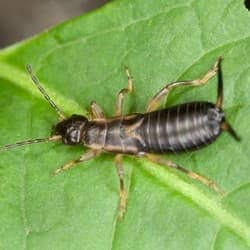
Earwigs Are Beneficial
9/26/2016
The earwig is a scavenger insect that eats the eggs and larvae of other insects. That means they will eat plant-damaging pests like the notorious aphid. They are also great to have around if you want to get rid soft-bodied creatures, like slugs. But, if they are not able to find their primary food sources, they will take to eating the leaves and tender roots of ornamental plants and vegetables. The damage they cause to leaves can make those leaves and plants look ragged and dotted with holes, which is not beneficial at all. So, at the end of the day, it is best to not have “any” plant-eating pests walking around in your yard.
Here are some tips for keeping earwigs away:
- Keeping your yard free of twigs, dead leaves, and other organic debris is a good first step. Earwigs prefer a yard that has lots of organic things to hide under. Keep your yard clean and free of this kind of debris. It is also a good idea to limit large stones, dead wood, wood piles, and areas of mulch.
- If you have mulch next to the foundation of your home, consider replacing it with gravel. Earwigs are moisture pests. That gravel will make your perimeter a drier and less hospitable zone for earwigs.
- Earwigs are drawn to light sources. If you have exterior lights, especially ground lights, consider keeping them off at night or replacing white bulbs with yellow insect-resistant lighting.
- Keep your shrubs trimmed so that air can circulate through the branches and keep things dry in there.
- Make sure you have no water collecting near your foundation walls. Examine your gutter system to be sure that you have no obstructions or breaks.
- Inspect any windows you have in your basement walls, and replace any mortar if you see areas that are cracking.
- Inspect your exterior walls for gaps, holes, and cracks, especially around pipes. These are perfect entry points for earwigs.
- If earwigs get into your basement, let them find it dry and unwelcoming. A dehumidifier will go a long way toward accomplishing this.
While earwigs do not bite, and their pinch is hardly worth mentioning, they can be a nuisance pest. With professional pest control services, you can keep earwigs, and other far more threatening pests, out of your home. And that is a greater benefit than having them around.









